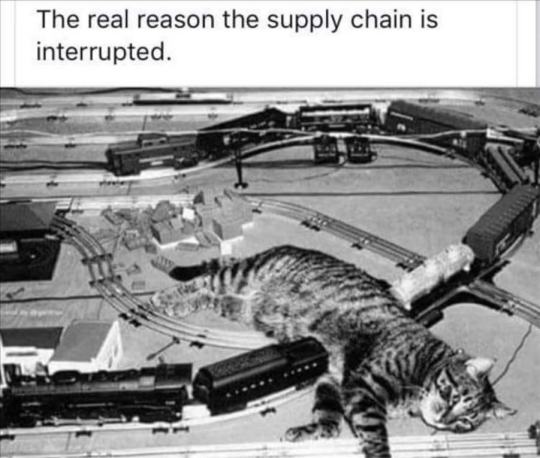#supply chain
Text
"A new community housing development in the Bronx will feature a cool piece of kit: an on-site aerobic digester that can turn 1,100 pounds of food scraps into 220 pounds of high-quality fertilizer every single day.
Built by Harp Renewables, it’s basically a big stomach filled with bacteria that breaks down food scraps and wasted food into their component parts, and in the future could be a standard part of all apartment units as the amount of food waste in American reaches 30% of the total mass of all trash collection.
The Peninsula, organized by Gilbane Development Company, will feature 740 units of affordable housing, 50,000 square-foot light industrial space and equal sized green space, and 15,000 feet of commercial space, all of which will send their castaway comestibles right into the digester...
Fast Company reports that Christina Grace, founder of a zero-waste food management company, helped plan the design and implementation of the digester into The Peninsula, and helped organize a 40% grant from the city to pay the $50,000 upfront cost.
“The goal is for this material to work its way into the community garden network in the Bronx,” [Christina Grace, who helped plan the design] told the magazine, adding that she expects it to pay for itself over just a few years. “We see this as highly replicable in both commercial and residential venues. We know there’s a need for fertilizer.”
Producing fertilizer right there in the city reduces the need for it to be trucked in from afar, chipping away, even if just a bit, at NYC traffic.
Big problem solver
Perhaps uniquely beneficial to New York City compared to other spots in the U.S. is that the digester will have a significant impact on the Bronx’s share of the city’s rodent problem.
Those who’ve watched the Morgan Spurlock documentary Rats will understand why that’s significant—while those that haven’t will have to imagine what living in a megacity where rats outnumber people by around 8 or 10 to 1 looks like.
Another big problem the bio-digesters could potentially help is pollution and greenhouse gas emissions. Fertilizer is a big emitter of all three of the most-targeted GHGs. Fertilizer, like quarry dust and ammonia is, like so many commodities, often imported from countries who specialize in its production, such as Norway, but also Russia and Ukraine, whose conflict has recently highlighted the fragility of the supply chain with sharp increases in prices...
Bio-digesters by design keep the CO2 and methane in the fertilizer produced, rather than it entering the atmosphere.
For these reasons and more, the aerobic bio-digester is slowly making its way into residential and industrial spaces around the country.
GNN reported on an enormous bio-digester at the heart of the D.C. advanced resource (sewage) recovery center outside the capital, and on the use of bio-digesters on Australian pig farms which are helping reduce the environmental and psychological impact of the effluent produced from such operations.
Harp Renewables tweeted how happy they were to have installed their bio-digester in the town of Cashel, Ireland.
Expect to see more stories like this pop up around the globe."
-via Good News Network, March 17, 2022
Note: Obviously gentrification bad and "affordable housing" is sometimes nowhere near as affordable as it should be, etc. etc. That said, this is such a fantastic use case that I felt I had to post it anyway.
#new york#new york city#bronx#bronx new york#supply chain#fertilizer#circular economy#sustainability#sustainable architecture#sustainable agriculture#united states#apartment buildings#bio-digester#good news#food waste#organic waste#hope#hope posting
323 notes
·
View notes
Text
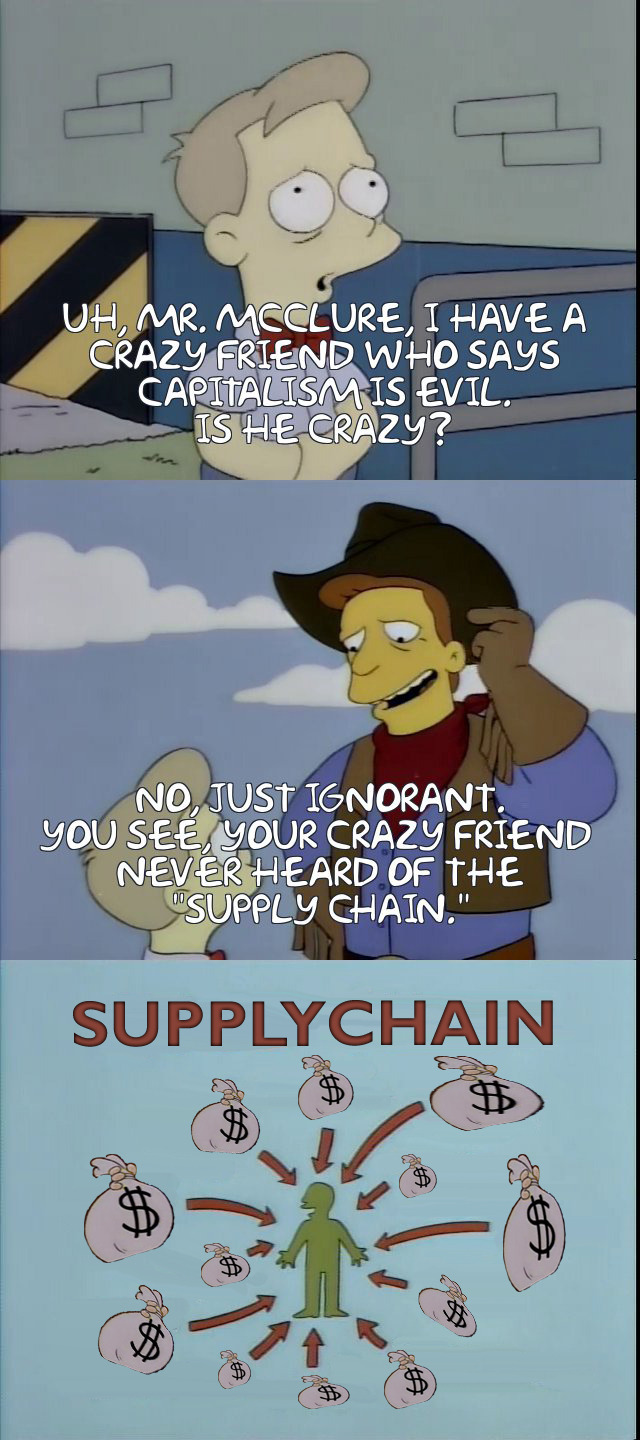
119 notes
·
View notes
Text
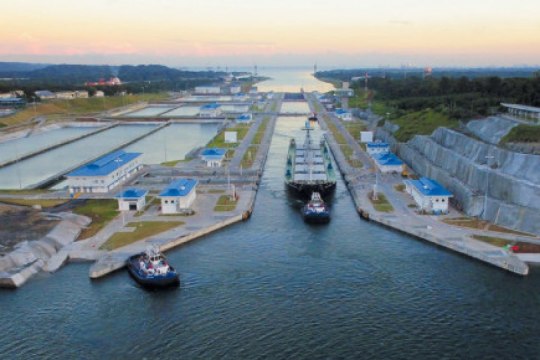
BULLETIN: The Panama Canal Has Stopped! Forty percent (40%) of the Global Supply Chain came to a halt today as the Panama Canal shut down. Ships are presently stuck on both the Atlantic and Pacific Ocean sides of the canal because the FRESHWATER lake, which supplies the locks between the two oceans, has suffered a drought and can no longer fill the locks to allow ships to sail through the canal.
Because of the severely reduced freshwater supply, Ships are being ordered to travel with 40% less weight to deal with less water. The Panama government said these restrictions will last at least 10 MORE MONTHS.
This is causing delays in shipments from Asia to the East coast of the United States This is also causing oil shipment delays from the Middle East and India (Bharat) to the West Coast of the USA.
Get stocked up NOW.
Hal Turner Remark: Let me see if I understand this . . . The Panama Canal has the Atlantic OCEAN, on one side, and the Pacific OCEAN on the other side, and somehow or another, we're supposed to believe they've run out of water to operate the canal zone? Why not use salt water through the canal zone? Let me guess . . . . the environment?
Are You Prepared? 🤔
#pay attention#educate yourselves#educate yourself#knowledge is power#reeducate yourself#reeducate yourselves#think for yourselves#think about it#think for yourself#do your homework#do your own research#do some research#ask yourself questions#question everything#food supply#supply chain
152 notes
·
View notes
Text

Source
#this was not on my 2023 bingo card but honestly we should have known#it’s not the ever given again#suez canal#ships#boats#supply chain#destiel meme#stuck ship#Fake-destiel-News#unreality#this is fake news#truth: the Suez Canal has not been blocked by a ship again
93 notes
·
View notes
Text
i notice a lot of tumblr users seem convinced apple is the only company that uses unethically sourced electronics materials and foxconn, and i'm sorry to say that's not true
every nintendo console since the gamecube has been produced by foxconn
sony's playstation consoles are produced by foxconn
the xbox consoles are produced by foxconn
like basically every major tech company you know of has worked with foxconn, xiamoi, nokia, sega, google, the blackberry
and that's just foxconn, that's just the people putting the stuff together. (to read more on this, I strongly recommend the book "Dying for an iPhone", which is a history of Foxconn and Foxconn's relation with Apple)
resource extraction is an even uglier game with fewer players. I'm sure you guys have heard about the congolese protests recently due to the mines expanding
nothing about the technology supply chain is clean or ethical. now, lots of supply chains are unethical and involve slavery or exploitation in some way or another - see the supply chain for textiles. but whereas an especially motivated and well-off person could buy from small farms for wool, the capital requirements to extract rare earth metals are so large that only large firms can afford to do so. firms with no incentive to increase the price of these operations by voluntarily caring about safety or ethics. the countries that are being extracted from are so poor and exploited that they have no real way to fight back, either.
i know we've all grown up with console wars and mobile phone wars and nintendo vs sony vs microsoft, nintendo vs sega, android vs iphone, but i'm sorry to say that it's all marketing, and all these companies play the dirty game of forced labor in their supply chain.
i can't tell you what the solution to this because 1. i am not an expert in international business? and 2. when transnational entities get involved, things very quickly become way out of the reach of what an ordinary citizen or even groups of citizens can do. foreign policy and business is out of our sphere of influence.
that's not to turn everyone into doomers, but to give perspective. there's no ethical console war here. if you're a student and you want to make this your career path, study economics, law, transnationalism... I recommend the book "Challenging the Chip: Labor Rights and Environmental Justice in the Global Electronics Industry," which is from 2006 but still relevant. (if you are in university, check jstor, your uni may have the book!)
42 notes
·
View notes
Text
is it just my eating disorder or should the agricultural society of america not have a say in how many calories the average person ought to eat per day?
#maybe i would also say you should have that many calories worth of grains if i was being paid six figures#to say as much#sus#scientific study#fake science#agriculture#eating disorder#for profit healthcare#weightloss#motivation#goals#suspicious#big food#supply chain#supply chain management#food crisis#thinspo#th1n$po#th1nsp1ration
22 notes
·
View notes
Quote
Our lives are caught between climate change, pandemics, wars, market crashes, biodiversity collapses, and supply chain disruptions. The new normal, it seems, is one where apocalyptic narratives predominate and where precarity is to be expected or even embraced. Many efforts to head off catastrophe, meanwhile, often seem inadequate to the task, embracing status quo politics or hanging their hopes on salvation through technological disruption. What, then, would an anti-catastrophic project that takes our myriad crises seriously but does not fall into the trap of catastrophic thinking look like? The aim of this project is to interrogate the concept of catastrophe – how it is defined, analyzed, and deployed – and anti-catastrophic practices in an attempt to envision alternatives to our present.
againstcatastrophe.net
#solarpunk#catastrophe#climate change#climate crisis#anti-catastophe#biodiversity#collapse#supply chain#quote
194 notes
·
View notes
Video
economic degrowth
#Tiktok#capitalism is a scam#climate change#climate crisis#renewable energy#renewable electricity#100% renewable#economy#economics#supply chain
61 notes
·
View notes
Text

Loaded this thing up yesterday a cool 5 1/2 hours after the appointment time. Due to that little bit of Monday luck we lost our Ohio highway patrol escort. The next available time for them is 2 PM today so we are just chilling. This will definitely throw a monkey wrench in our first thing Thursday morning delivery in Gulfport MS.
#peterbilt #oversize #heavyhaul #supplychain #transportation #trucker #trucking #travel #cdl #cdllife #bluecollar
#trucking#truckinglife#trucker#cdllife#cdl#travels#supply chain#transportation#peterbilt#oversized#heavy haul trucking#schedule
18 notes
·
View notes
Quote
Once the heart is won to rest in God, to repose on him, God will certainly satisfy it. He will never be like water that fails to quench. Nor has he said at any time to the seed of Jacob, “You seek my face in vain.” If Christ is chosen as the source of our supply, then he will not fail us.
John Owen
32 notes
·
View notes
Text
Highlighting a few things about the railroad strike (just passing info along, I'm just now learning about it). The mainstream media, politicians, etc. are trying to spin this and the purpose behind the strike. This thread has lots of useful info and other threads about the railroad strike. I'll add the link in the reblog so this shows up in the search.
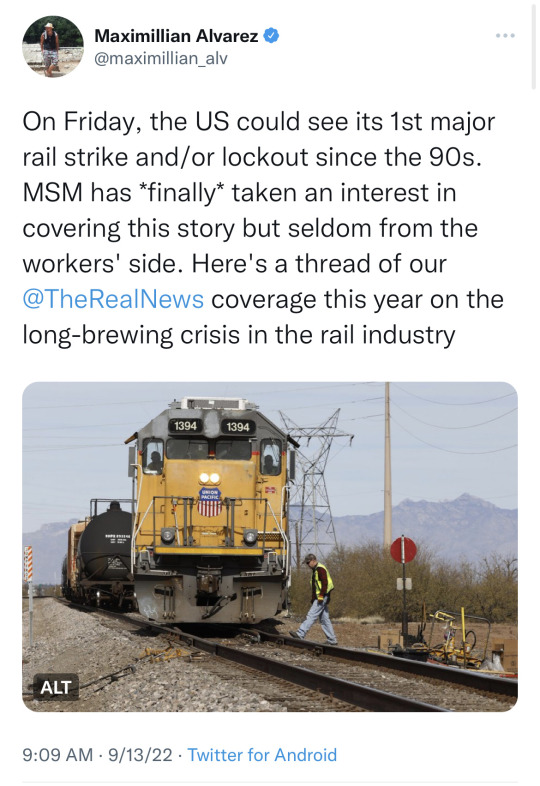
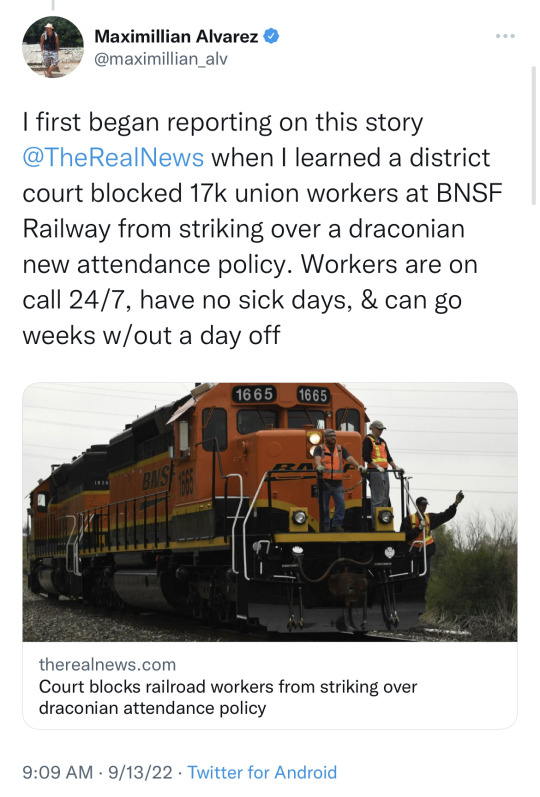
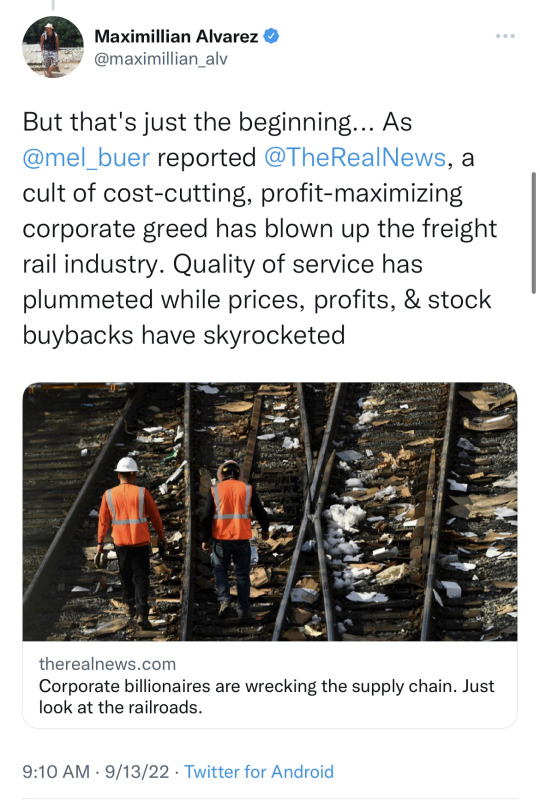

#railroad strike#worker solidarity#workers rights#railroad workers#unions#corporate greed#supply chain
127 notes
·
View notes
Text
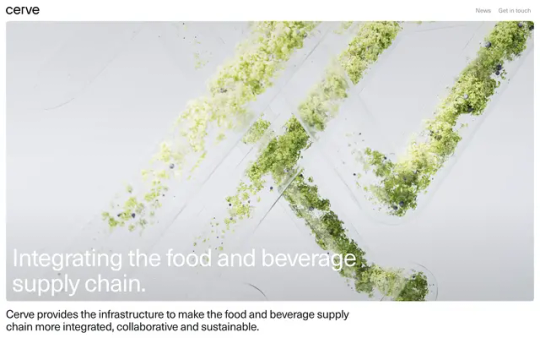
Cerve
#Cerve#food#beverage#supply chain#collaborative#sustainable#white#typography#type#typeface#font#Neue Haas Unica#2024#Week 03#website#web design#inspire#inspiration#happywebdesign
6 notes
·
View notes
Text
Supply chain disruptions were inevitable 🤔
#pay attention#educate yourselves#educate yourself#knowledge is power#reeducate yourself#reeducate yourselves#think about it#think for yourselves#think for yourself#do your homework#do some research#do your own research#ask yourself questions#question everything#supply chain#supply chain disruptions
27 notes
·
View notes
Text
Disclaimer: I am not the original owner or creator of this content. The source is listed below.
#tiktok#bangladesh#fashion news#fashion#fast fashion#zara#h&m#gap#gap inc#supply chain#supplychainmanagement#supply chain management#Asia#south asia#asian news
9 notes
·
View notes
Text

LETTERS FROM AN AMERICAN
November 27, 2023
HEATHER COX RICHARDSON
NOV 28, 2023
Today Hamas released 11 more hostages into Israel; in exchange, Israel released 33 Palestinians from prison. Both sides have agreed to extend the truce for two days and to continue the exchanges. Hamas has committed to releasing an additional 20 women and children, and if the past pattern holds, Israeli releases will be three times that number.
The four-day pause in fighting has permitted aid to Gaza to increase. Since the 21st of October, when the first aid trucks began to cross into Gaza, more than 2,000 trucks of aid and assistance have gone in.
Once the deal was secure, President Joe Biden issued a statement: “I have remained deeply engaged over the last few days to ensure that this deal—brokered and sustained through extensive U.S. mediation and diplomacy—can continue to deliver results.” He noted that more than 50 hostages have been released and that the U.S. “has led the humanitarian response into Gaza—building on years of work as the largest funder of humanitarian assistance for the Palestinian people.”
In his third trip to the region since the October 7 attack, Secretary of State Antony Blinken will travel to Israel and the West Bank later this week. He is currently in Brussels for a meeting of foreign ministers in the North Atlantic Treaty Organization (NATO) and will go to the Middle East from there. The State Department says that, among other things, Blinken will “discuss the principles he outlined in Tokyo on November 8, tangible steps to further the creation of a future Palestinian state, and the need to prevent the conflict from widening.”
In that November 8 address, Blinken outlined the U.S. administration’s policy for the future of Gaza. “[K]ey elements,” he said, are “no forcible displacement of Palestinians from Gaza—not now, not after the war. No use of Gaza as a platform for terrorism or other violent attacks. No reoccupation of Gaza after the conflict ends. No attempt to blockade or besiege Gaza. No reduction in the territory of Gaza. We must also ensure no terrorist threats can emanate from the West Bank.”
Blinken said that “the Palestinian people’s voices and aspirations” must be “at the center of post-crisis governance in Gaza” and that “Palestinian-led governance and Gaza unified with the West Bank under the Palestinian Authority” are U.S. requirements.
Gaza will need a “sustained mechanism for reconstruction,” Blinken said on November 8, “and a pathway to Israelis and Palestinians living side by side in states of their own, with equal measures of security, freedom, opportunity, and dignity.”
At home, the administration today announced nearly 30 new actions to strengthen the country’s supply chains, both because smoother supply chains should reduce consumer prices and because stronger supply chains should ensure that the U.S. doesn’t fall short of critical supplies, such as medicines.
On February 24, 2021, about a month after he took office, Biden established a task force across more than a dozen departments and agencies to figure out where supply chains were vulnerable. After research and analysis, as well as input from industry leaders, experts, and the public, the task force issued a 250-page report in June 2021.
Their recommendations, along with investments in key industries such as semiconductors and in infrastructure, helped to untangle the supply chains that remained snarled through 2021 (remember the 100 cargo ships waiting to dock in fall 2021? Now, two years later, there are fewer than 10). From October 2021 to October 2023, supply chain pressure, which is tracked by the Federal Reserve Bank of New York, fell from near-record highs to a record low. That, in turn, has helped to lower inflation.
Now Biden has established a new White House Council on Supply Chain Resilience to make sure those supply chains stay strong. He will also use the Defense Production Act—a law from 1950 that requires companies to make a certain product deemed necessary to national defense in exchange for guarantees that the product will have a buyer—to make more essential medicines in the United States and to increase production of new clean energy technologies. The U.S. Department of Agriculture, one of the many government entities involved in supply chains, will invest $196 million to strengthen domestic food supply chains.
The country is also working with other countries on this issue: two weeks ago, Biden signed a supply chain agreement with 13 countries in the Indo-Pacific that he said will enable the countries to identify supply chain bottlenecks “before they become the kind of full-scale disruptions we saw during the pandemic.”
Clearly staking out positions for the upcoming election, Biden in his explanation of his new supply chain policy warned that MAGA Republicans want to cut the recent investments in roads, bridges, the Internet, and so on, that have created so many new jobs in infrastructure and manufacturing. (Those measures are popular: House speaker Mike Johnson (R-LA) joined members of the Florida congressional delegation today to view an expansion project at the Sarasota Bradenton International Airport funded by the Bipartisan Infrastructure Law although Johnson voted against it.)
“[T]hey want to go back to the ‘bad old days,’” Biden said, “when corporations looked around the world to find the cheapest labor they could find, to send the jobs overseas, and then import the products back to the United States. Now we’re building the products here and exporting products overseas.”
In contrast to the governance Democrats have been delivering, the Republicans appear to be doubling down on their grievances. Representative Jim Jordan (R-OH), who chairs the House Select Subcommittee on the Weaponization of Government, announced today the committee will hold another hearing on Thursday concerning “the federal government’s involvement in social media censorship, as well as the recent attacks on independent journalism and free expression.”
The idea that the federal government is silencing right-wing speech is an article of faith among MAGA Republicans, although their committee’s last hearing, eight months ago, turned up nothing. Thursday’s hearing will feature three witnesses, two of whom also testified in the last hearing.
MAGA Republicans might be keen to create distraction after Colorado District Judge Sarah B. Wallace found that Trump “engaged in an insurrection on January 6, 2021.” Wallace found that “Trump acted with the specific intent to incite political violence and direct it at the Capitol with the purpose of disrupting the electoral certification.” She did not disqualify him from the ballot, but the decision will continue to move up through the court system.
Meanwhile, former president Trump appears to be getting nervous that former South Carolina governor Nikki Haley is gaining momentum. On Saturday he showed up at the University of South Carolina–Clemson football game, South Carolina’s main football rivalry. As Isaac Bailey of The State wrote, that Trump felt he had to try to upstage Haley suggests not strength, but weakness. Indeed, while there were cheers for him, there were also boos.
Yesterday, on Face the Nation, Representative Ken Buck (R-CO), who is not running for reelection, went after Trump. “Everybody who thinks that the election was stolen or talks about the election being stolen is lying to America,” Buck said. “Everyone who makes the argument that January 6 was, you know, an unguided tour of the Capitol is lying to America. Everyone who says that the prisoners who are being prosecuted right now for their involvement in January 6, that they are somehow political prisoners or that they didn’t commit crimes, those folks are lying to America.”
As pressure on him increases, Trump is playing hard to his base, promising on Saturday, for example, that he was “seriously looking at alternatives” to the Affordable Care Act (ACA), more popularly known as Obamacare. He suggested the law should be overturned.
Democratic National Committee chair Jamie Harrison noted on social media that more than 40 million Americans depend on the ACA for their health insurance and that the law also protects as many as 135 million Americans with preexisting conditions from losing their health insurance.
LETTERS FROM AN AMERICAN
HEATHER COX RICHARDSON
#Biden Administration#accomplishments#supply chain#Israel-Hamas war#Letters from An American#Heather Cox Richardson
6 notes
·
View notes
